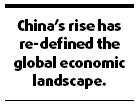Opinion
A decade of growth
(China Daily)
Updated: 2010-01-04 07:48
 |
Large Medium Small |
If the 9/11 terror attack on the US in 2001 set the tone for the world's political arena in the first decade of the new millennium, it is no exaggeration to say that China's rise re-defined the global economic landscape.
Statistics abound to testify to China's rising economic prowess. To name but a few, once the numbers come in China will probably have replaced Germany to become the world's top exporter in 2009; it is set to replace Japan to become the world's second largest economy next year, from the 10th place 10 years ago; and it is playing a leadership role, together with other major players, in building a more fair and rational world economic order.
The country's ascent in the past decade, however, would have been unbelievable for many Chinese 10 years ago, when East Asia was reeling in the wake of the devastating Asian financial crisis. To anchor the regional economy, China unswervingly but painfully decided to hold its currency firm, despite the domino-like fall of other regional currencies. The price it paid as a result was slumping exports and slowing economic growth at the turn of the century.
Since then, its economic leadership in the region has been growing, and so has its integration into the world economy. In 2001, China became a member of the WTO, marking a new page in the world's economic history. More recently, it has been playing an increasing role in reforming the global financial regime, which was previously monopolized by developed countries.

Economists estimate that in 2009, China could have contributed to about half of the world's economic growth. It speaks volumes about what that integration means for the world.
China's economic achievement, however, has not come easily. Internationally, it has come amid the recurrent "China threat" accusation from some countries that feel uneasy about China's rising economic power.
When the world economy suffered from falling prices, China was readily accused of "exporting deflation" to the rest of the world; when world market prices rose, China was accused of driving up prices. When the Asian currencies faced the danger of collapse in the Asian financial crisis, the yuan was asked to stand firm; when some countries suffered a trade deficit, they demanded that China raise the value of the yuan.
| ||||
Domestically, China has to continually push its market economy reform against frequent attempts by some to retreat to the old centralized economic management. For Westerners, who have taken for granted that the market economy is the best choice for economic development, it is hard to understand how strenuously Chinese policymakers have pushed that reform, something that was only initiated in the early 1980s.
Moreover, it is yet to solve such problems as a widening wealth gap, unbalanced regional development, restructuring of the manufacturing- and export-centered economy as well as the build-up of what will be a costly social security system.
If the past decade saw China rise to become an international economic powerhouse, the next will see how China deals with those internal economic challenges to make its development more sustainable.













